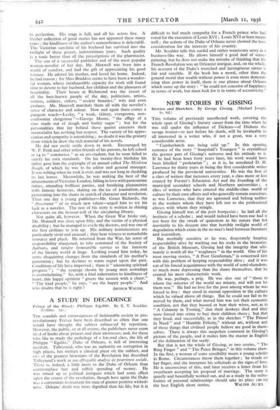NEW STORIES BY GISSING
Stories and Sketches. By George Gissing. (Michael Joseph. 7s. 6d.)
THIS volume of previously uncollected work, covering the whole span of Gissing's literary career from the time when he
was still under the influence of Dickens—of Dickens the savage ironist—to just before his death, will be invaluable to all interested in a writer who, if not a great, was a very considerable artist.
" Cumberbatch was being sold up." In this opening sentence of the story " Snapshall's Youngest " is crystallised the greater part of Gissing's universe and his attitude to it.
If he had been born forty years later, his work would have been labelled " proletarian " ; as it is, he antedated D. H.
Lawrence by thirty years in being the first considerable writer produced by the provincial universities. He was the first of a class of writers that increases every year, a class more or less created by Forster's Education Act and the founding of the municipal secondary schools and Northern universities ; a class of writers who have entered the middle-class world of culture by their own efforts and who generally remain conscious, as was Lawrence, that they are uprooted and belong neither to the workers whom they have left nor to the professional classes with whom they mingle.
Gissing himself was of the petit bourgeoisie ; he had all the instincts of a scholar ; and would indeed have been one had it not been for the streak of quixotism in his nature that led inevitably to his descent into that horrible twilight world of degradation which exists in the no man's land between literature and journalism.
But morbidly sensitive as he was, desperately keeping respectability alive by washing out his socks in the lavatories of the British Museum, Gissing had the integrity that ulti- mately is worth all the " toughness " in the world. One of his most moving stories, "A Poor Gentleman," is concerned just with this problem of keeping respectability alive ; and it was out of his forced acquaintance with the world of semi-slumdom, so much more depressing than the slums themselves, that he created his most characteristic work.
He was, perhaps, a prig. He was also one of " those to whom the miseries of the world are misery, and will not let them rest." He had no love for the poor among whom he was forced to live : they stood in eternal opposition to the culture which he valued above all things. But he could not fail to be moved by them, and what moved him was not their economic condition, not that they boozed or beat their wives, not, as in " A Calamity in Tooting," that their donkeys died and they were forced into crime to buy their children shoes ; but that they lived, and successfully, as in the sketches " The Friend in Need " and " Humble Felicity," without art, without any of those things that civilised people believe are good in them- selves. There is always this unspoken comment in Gissing's picture of the people, and it makes him the master in English of the delineation of the seedy.
But that is not the whole of Gissing, as two stories, " The Ring Finger " and " The Peace Bringer," in this volume show-
In the first, a woman of some sensibility meets a young scholar in Rome. Circumstances throw them together ; he treads on her finger, and she interprets his solicitude as the signs of love. He is unconscious of this, and later receives a letter from his sweetheart accepting his proposal of marriage. The story is quietly and beautifully worked out, and as a study in the nebu- losities of personal relationships should take its place tm)ng the best English short stories. WALTER All EN.










































 Previous page
Previous page